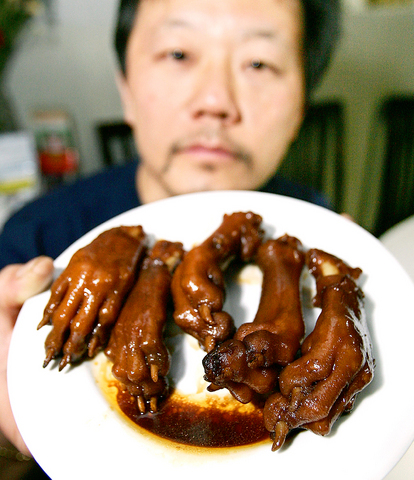The Year of the Dog dawns on Sunday, but it brings mixed fortunes for man's best friend in a culture where people increasingly keep canines as pets while others condemn them to the cooking pot.
Once banned as a bourgeois luxury, pet ownership is becoming big business in China and, with one in every nine Chinese now owning a dog, they are beginning to enjoy the status pampered pooches have in some other parts of Asia.
Owners from Taipei to Tokyo spend thousands of dollars on their furry friends at grooming parlors which offer pedicures, acupuncture and massages along with a more usual coat trim.

PHOTO: AFP
Dogs there even have their own cafes, funeral homes and schools.
But they remain the lucky ones.
Canines are still commonly eaten as a delicacy in China and Chinese communities around Asia. Others are skinned alive for their fur to make trimming for clothing and fashion accessories.
Up to 10 million dogs are slaughtered every year in China, many killed slowly and cruelly to supposedly enhance the meat's flavor, according to Jill Robinson, founder and chief executive officer of the Hong Kong-based Animals Asia Foundation.
"People's attitudes have been changing over the past 15 years, but China is still the world's biggest consumer of dogs," Robinson said.
In northern China large dogs such as St Bernards and Tibetan Mastiffs were being cross-bred with local dogs to create fast-growing, large meat dogs that could be slaughtered as young as four months old, she said.
Even in cosmopolitan cities such as Beijing, dog restaurants remain part of the cityscape, most popular in winter as dog meat is supposed to keep you warm and tastes like beef according to those who have tried.
Skinning of live dogs for fur also takes place in China, mainly because it helps preserve the skin of the canines, according to animal activists.
Yu Fachang, an official in charge of market order at the State Administration of Industry and Commerce, this month confirmed the practice was ongoing.
"Currently, in some parts of the country, in some animal markets, animals are skinned alive, like cats and dogs. It's individual cases taking place at individual markets," he said.
"We still don't have any laws on the slaughtering of ordinary animals such as cats and dogs, as they do not belong into the category of traditional food," he said, adding that regulation was being prepared.
Rock star Paul McCartney said last November that he would never perform in China after watching a disturbing secret video of dogs and cats in a market being slaughtered for fur.
The video, from the German branch of the animal rights group PETA, shows caged dogs in wire cages being hurled from the top deck of a converted double-decker bus onto a concrete pavement at a market in southern China.

The Burmese junta has said that detained former leader Aung San Suu Kyi is “in good health,” a day after her son said he has received little information about the 80-year-old’s condition and fears she could die without him knowing. In an interview in Tokyo earlier this week, Kim Aris said he had not heard from his mother in years and believes she is being held incommunicado in the capital, Naypyidaw. Aung San Suu Kyi, a Nobel Peace Prize laureate, was detained after a 2021 military coup that ousted her elected civilian government and sparked a civil war. She is serving a

REVENGE: Trump said he had the support of the Syrian government for the strikes, which took place in response to an Islamic State attack on US soldiers last week The US launched large-scale airstrikes on more than 70 targets across Syria, the Pentagon said on Friday, fulfilling US President Donald Trump’s vow to strike back after the killing of two US soldiers. “This is not the beginning of a war — it is a declaration of vengeance,” US Secretary of Defense Pete Hegseth wrote on social media. “Today, we hunted and we killed our enemies. Lots of them. And we will continue.” The US Central Command said that fighter jets, attack helicopters and artillery targeted ISIS infrastructure and weapon sites. “All terrorists who are evil enough to attack Americans are hereby warned

Seven wild Asiatic elephants were killed and a calf was injured when a high-speed passenger train collided with a herd crossing the tracks in India’s northeastern state of Assam early yesterday, local authorities said. The train driver spotted the herd of about 100 elephants and used the emergency brakes, but the train still hit some of the animals, Indian Railways spokesman Kapinjal Kishore Sharma told reporters. Five train coaches and the engine derailed following the impact, but there were no human casualties, Sharma said. Veterinarians carried out autopsies on the dead elephants, which were to be buried later in the day. The accident site

‘EAST SHIELD’: State-run Belma said it would produce up to 6 million mines to lay along Poland’s 800km eastern border, and sell excess to nations bordering Russia and Belarus Poland has decided to start producing anti-personnel mines for the first time since the Cold War, and plans to deploy them along its eastern border and might export them to Ukraine, the deputy defense minister said. Joining a broader regional shift that has seen almost all European countries bordering Russia, with the exception of Norway, announce plans to quit the global treaty banning such weapons, Poland wants to use anti-personnel mines to beef up its borders with Belarus and Russia. “We are interested in large quantities as soon as possible,” Deputy Minister of National Defense Pawel Zalewski said. The mines would be part